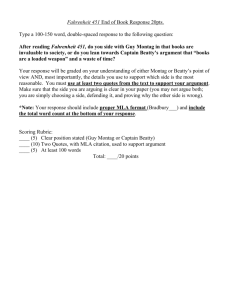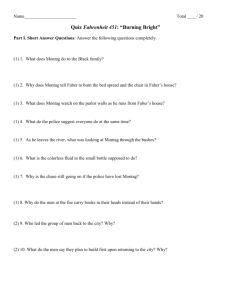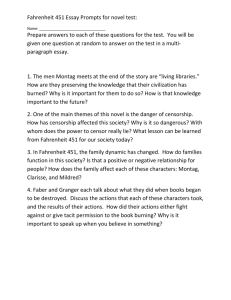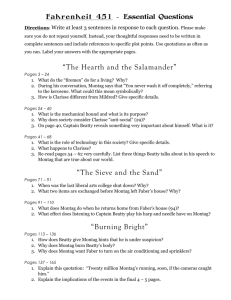Fahrenheit 451 study questions and answers - part 2
advertisement
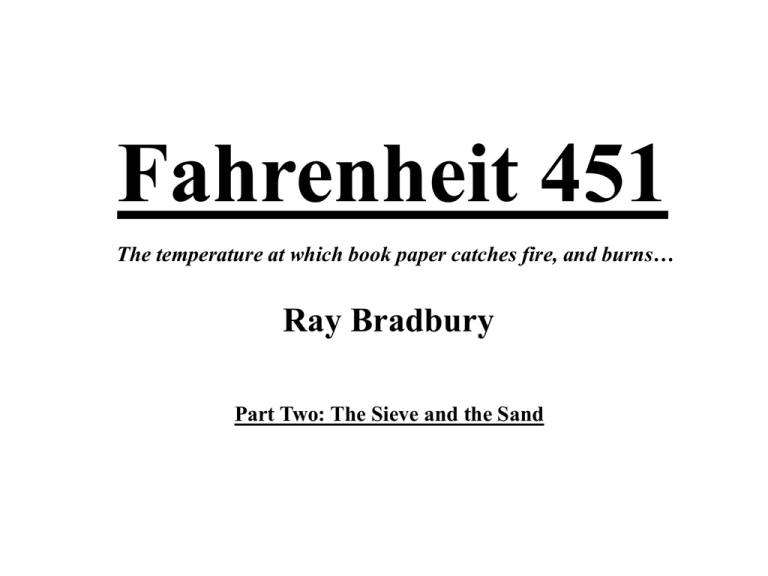
Fahrenheit 451 The temperature at which book paper catches fire, and burns… Ray Bradbury Part Two: The Sieve and the Sand Part 2: The Sieve and the Sand 1. Explain in your own words why you believe the author chose the title “The Sieve and the Sand”. What is symbolic about this title? The author chose the title “The Sieve and the Sand” because of the first reason Faber gives: the quality of books. He gives the example that “This book has pores” referring to what’s underneath the words. It also symbolises society in the sense that everyone follows. 2. a) What does Guy mean when he says : “Maybe the books can get us half out of the cave.” (p. 74) When Guy says “Maybe the books can get us half out of the cave”, he means that they will gain some sort of knowledge of the world, bit by bit. b) On page 75, Guy remembers his first encounter with Faber. What important observation did Faber make? How does this show us his true identity? Guy’s first encounter with Faber, this last made the observation that he thought instead of speaking when he said: “I don’t talk things, sir…I talk meaning of things. I sit here and know I’m alive.” c) What important decision does Montag make at this point? (p. 74-75) Montag decides to keep in touch with Faber when he kept his number: “FUTURE INVESTIGATIONS (?). Faber’s name was there. He hadn’t turned it in and he hadn’t erased it.” d) Why does he make this decision? He makes this decision because he wants to know more about literature and it’s meaning. 3. Find a simile on page 80. The simile on page 80 is: “the train hissed like a snake”. 4. What is symbolic about the description of Faber and his house? The symbolism in the description of Faber and his house is the same as Clarisse in the first part, in the sense that everything is white. “Faber peered out, looking very old in the light and very fragile and very much afraid…the white plaster walls…white in the flesh of his mouth and his cheeks and his hair was white and his eyes had faded, with white in the vague blueness there.” 5. On page 82, what reason does Montag give to explain his visit to Faber’s house? The reason Montag gives to explain his visit to Faber’s house on page 82 is to find out what’s in books. “I don’t know…So I thought books might help.” explains this very well. 6. Find a personification on page 82. The personification on page 82 is “I can’t talk to the walls because they’re yelling at me”. 7. a) According to Faber, what three things does Guy need to understand what he (Faber) is saying? (p. 83-85) According to Faber, Guy needs to understand three things: 1. The quality of books; 2. The leisure to digest it; 3. The right to carry out actions based on what we learn from interaction of the first two. b) Briefly explain, in your own words, each element. 1. The quality of books refers to what is written in them and what is hidden in them. He speaks of the fact that books are timeless, ex. Hercules and Antaeus. 2. The second one speaks for itself for he does not offer any explanations, but “the leisure to digest it” means the time you need to take to understand books. 3. The third is to give your opinion on what you have read. 8. a) What small green metal object does Faber give Montag? (p. 90) The small green metal object Faber gives Montag is a sort of earpiece that can listen and talk to at the same time. “He picked up a small green metal object no larger than a .22 bullet…It looks like a Seashell Radio”. b) What is the purpose of this object? The purpose of this object is to listen in to and make conversation with people of importance such as Captain Beatty. “Let’s listen to this Captain Beatty together…I’ll give you things to say”. 9. On pages 91 and 92, how does the author use foreshadowing to create the mood? The author creates the mood by forshadowing a war when he says at the end of page 91 and beginning of page 92: “You could feel the war getting ready…That was how the night felt.” 10. What was the purpose of having Mrs. Phelps and Mrs. Bowles in the story? Explain. (p. 94-95) The author chose to put Mrs. Phelps and Mrs. Bowles in the story to give us a better view of how the people reacted or conversed in this world filled with nothingness or rather premeditated lectures. It also shows us how they switch conversations when they get emotional. “He said, if I get killed off…That reminds me…did you see that Clara Dove five-minute romance last night”. 11. Why did Mrs. Bowles “insist” on having two caesarians? (p. 96) Mrs. Bowles insisted on having two caesarians because she doesn’t want the pain: “No use going through all that agony for a baby”. 12. a) What arguments did Mrs. Bowles use for voting for President Noble? (p. 96-97) Mrs. Bowles said that she voted for President Noble because he looked better and everyone else was going to vote for him when she said: “I voted last election, same as everyone…I think he’s one of the nicest-looking men ever became president.” b) Do you agree with these arguments? Explain. Although I don’t agree with these arguments, they lead me to think about the voting system in our world, and to the fact that many people vote for the same reasons as Mrs.Bowles does. c) How does Guy react to all of this? Find one sentence that supports your theory. Guy is very upset to these comments when he swears a lot at these : “Damn it…What do You know about Hoag and Noble…Damn it all, Damn it all, damn it.” 13. a) How do Mrs. Phelps and Mrs Bowles react to Guy’s poetry reading? Mrs Phelps reacts by asking Guy to read from the poem just to shut him up. “Why don’t you just read us one of those poems from your little book…Mr. Montag will be happy and then maybe we can go on and do something else. As for Mrs Bowles, she says she hates it at first “As for poetry, I hate it” and then, when Montag questions her about her opinion she wants to leave: “I’m going home”. She later reminds him that it is illegal: “That’s not right…We can’t do that” (p. 98) Later, Mrs Phelps cries and Mrs. Bowles said she anticipated this reaction and blames it on his poetry: “poetry and suicide and crying and awful feelings…Mr. Montag, you’re nasty!” (p. 101) b) What reaction does Mildred have? Explain by finding one sentence in the novel that supports your theory? (p. 101) Mildred tries to comfort her guest by changing the subject: “Clara, now Clara…Come on, let’s be cheery, you turn the ‘family’ on now Go ahead. Let’s laugh and be happy now, stop crying, we’ll have a party!”. She later curses Guy for what he has done: “Fool, Montag, fool, fool, oh God you silly fool…” while she is taking sleeping tablets. c) Do you believe Guy went too far? Explain. I think that Guy went too far because he can get in a lot of trouble for this. He also upset his wife and his new friend Faber. The worst part is the words he uses and the manner with which they are said: ““Go home, go home!” he yelled. “Before I knock you down and kick you out the door!””. 14. Find a personification on page 104. The personification on page 104 is: “the firehouse stood all about in plaster silence and the orange Salamander slept with its kerosene in its belly and the fire throwers crossed upon its flanks”. 15. Why did Montag wash his hands so often? What is symbolic about this? Montag washes his hands often to wash off the guilt of being a fireman. “Montag felt the guilt of his hands…he hid his hands under the table.” This is symbolic of the harm he has done to the society all those years and now realises it. It is also symbolic of the relationship he has with Beatty, as in he does not want to be associated with him anymore. 16. a) What did Captain Beatty do after Montag returned to the firehouse? (p. 105-108) Captain Beatty begins by throwing away the book Montag had. He then starts shooting quotes at Montag and asks him to tell him the meanings of these. b) How did Montag react? Explain. Besides the fact that Montag washes his hands often, when Beatty starts giving all the literary information to Montag he reacts with confusion: “Montag bit his lip…He wanted to yell, “No! Shut up, you’re confusing things, stop it!...Montag’s head whirled sickeningly”. 17. What emotions did Montag experience as he and the other firemen drove in the Salamander? Montag is very angry when he is driving in the Salamander: “One rage turned in for another. One anger displacing another. When would he stop being entirely mad and be quiet, be very quiet indeed?” (p. 109) “I can’t do it, he thought. How can I go at this new assignment, how can I go on burning things? I can’t go in this place.” (p. 110) We find out later in this same page that this place is his own house and that is how part 2 ends.

